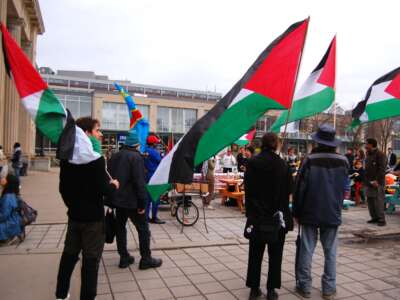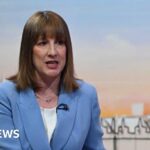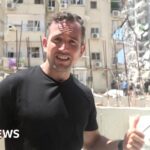Montreal, Canada – Civil rights advocates and Palestinian solidarity groups in Canada have raised alarm over a growing wave of municipal bylaws prohibiting protests outside houses of worship, schools, and other sites.
They say the measures — which have been passed in Canada’s largest city, Toronto, among other places, and are being considered elsewhere — infringe on freedom of expression and freedom of peaceful assembly.
Activists have also warned that the bylaws are part of a wider push to stifle demonstrations against Israel’s genocidal war against Palestinians in the Gaza Strip.
Stay in the loop
Never miss the news and analysis you care about.
“It’s clear that this isn’t a response to an overall concern around the management of protest,” said Tim McSorley, national coordinator of the International Civil Liberties Monitoring Group, a coalition of dozens of civil society groups in Canada.
Instead, the bylaws are “a response to the overwhelming and unsubstantiated attacks on pro-Palestinian protests across the country,” McSorley told Truthout in an interview. “It’s based in anti-Palestinian racism and based in the characterization of those who would protest in favor of Palestinian human rights, against the ongoing genocide, as all being supporters of terrorism, which is clearly not the case.”
“Thieves Selling Properties Inside a Synagogue“
On May 22, the Toronto city council passed what has been colloquially referred to as a “bubble zone” bylaw, prohibiting certain rallies within 50 meters (164 feet) of places of worship, schools, child care centers, and other institutions.
The regulation prohibits gatherings that discourage attempts to use the site; “obstruct, hinder or interfere with” access to the site; or “express an objection or disapproval towards any person” based on race, religion, citizenship, or other factors.
Individuals found to be violating the bylaw — which will come into force on July 2, 2025 — will face a fine of up to $5,000 Canadian ($3,650 USD).
The move followed the passage of similar bylaws in the Toronto-area cities of Vaughan and Brampton, as well as in Calgary in the western province of Alberta. The city council in Ottawa, the Canadian capital, is also considering a similar measure.
The protest was organized there because the synagogue was hosting a real estate event that included homes in Israeli settlements in the occupied West Bank, which are illegal under international law.
And while the Toronto bylaw states that it “does not prohibit peaceful gatherings, protests or demonstrations,” civil rights advocates say unequivocally that the measure — and others like it — aims to stifle demonstrations.
David Mivasair, a rabbi and active member of the group Independent Jewish Voices-Canada, said the wave of Toronto-area bylaws came in response to a large demonstration that was held last year at a local synagogue.
The protest was organized there because the synagogue was hosting a real estate event that included homes in Israeli settlements in the occupied West Bank, which are illegal under international law.
“If car thieves were running a used car sale in the parking lot of a synagogue, and the police knew that’s what was going on, they would shut it down immediately. What we had was land thieves selling properties inside a synagogue,” Mivasair told Truthout.
He added that the purported issue that the bylaws are seeking to address — religious-based intimidation targeting people at their houses of worship — is a false problem.
“No one that I’m aware of has ever protested at a house of worship while people are worshipping because they’re somehow opposed to people worshipping. That’s not what’s going on,” he told Truthout in an interview.
Instead, Mivasair said the bylaws “are intentionally designed — engineered — by major Zionist organisations in Canada who want to suppress honest, public discourse about Israel and Palestine” and outlaw Israel-related protests.
Pro-Israel Lobby Groups Pushing Bans
Indeed, the demonstration at the synagogue had drawn the ire of pro-Israel lobby groups in Canada, which had been calling for protests to be banned near Jewish community institutions after Israel’s Gaza war began in October 2023.
When the City of Vaughan introduced its bylaw to ban protests within 100 meters (328 feet) of “vulnerable social infrastructure” last year, the Centre for Israel and Jewish Affairs welcomed the move.
“In a democratic and pluralistic society, we should expect to be faced with people we disagree with.”
The center — arguably Canada’s most prominent pro-Israel organization — has been pushing for strict enforcement of the bans, saying in December of last year that it was “crucial” for the Toronto bylaw to “have teeth.”
“It must include punitive measures for noncompliance, contain enforcement powers, and, most importantly, it must be enforced,” the group said.
The center has also lobbied for legislation at the federal level that would criminalize what it dubs “dangerous protests” outside institutions.
Canadian Prime Minister Mark Carney appears to be considering a federal prohibition in line with what the Centre for Israel and Jewish Affairs and other pro-Israel lobby groups have been calling for.
On May 22, Carney wrote in a social media post denouncing the deadly shooting of Israeli embassy workers outside the Capital Jewish Museum in Washington, D.C., that his government would “introduce legislation to make it a criminal offence to intentionally and willfully obstruct access to any place of worship, schools and community centres.”
The legislation would also make it “a criminal offence to willfully intimidate or threaten those attending services at these locations,” the prime minister said.
Unnecessary and Unconstitutional
But legal experts say the bylaws violate Canada’s constitution, known as the Canadian Charter of Rights and Freedoms.
The charter outlines four fundamental freedoms in Canada, including freedom of expression and freedom of peaceful assembly. It states that those freedoms can only be limited if such limits “can be demonstrably justified in a free and democratic society.”
“They’re trying to shut down the public’s right to express disapproval.”
Christine Van Geyn, litigation director at the Canadian Constitution Foundation, said last month that the bylaws fail to meet that test.
“The right to protest is a fundamental right of Canadians. This new bylaw [in Toronto] will prohibit public protests on matters of public interest and will unjustifiably infringe on the right to freedom of expression,” Van Geyn said in a statement.
“While many Canadians disagree with and are upset with some of the protests we have seen in Toronto lately, there is no right not to be offended. In a democratic and pluralistic society, we should expect to be faced with people we disagree with,” she said.
James Turk, director of the Centre for Free Expression at Toronto Metropolitan University, also said the bylaws are unnecessary insomuch as Canada already has laws on the books around illegal behaviour at protests.
“Engaging in violence in Canada, threatening violence, engaging in hate speech as is defined in the Criminal Code and by our courts, obstructing people from going into buildings — are all currently against the law,” Turk told Truthout in an interview.
“A new bylaw is not going to do anything to change that,” he said, adding that in Toronto, the city police service came out against the bylaw by saying it already had the tools necessary to respond to demonstrations.
Legal Challenge Likely in Toronto
The solicitor for the City of Toronto also acknowledged that the bylaw would likely face a legal challenge.
According to a confidential report obtained by the Toronto Star, the solicitor had said the city should “narrowly” tailor the bylaw so that it could argue that it limited as much as possible any infringements on the Charter of Rights and Freedoms.
But the city council stripped away many of the guardrails the solicitor had proposed, including a requirement for institutions seeking to enforce the bylaw on their property to show that a demonstration had taken place there before when applying for protected site status (i.e., applying to have the bylaw actively enforced at their site).
The text of the bylaw that was passed now only states that the owners of an institution must “reasonably believe” a gathering prohibited under the regulations “may occur” within 50 metres (164 feet) of their property. They can then be approved to apply the bylaw for a one-year period, with option to renew for another year.
“People who were pretty zealous to have a bylaw passed — and it was largely some of the pro-Israeli lobby groups — were able to pressure council enough that they undid most of the narrow provisions” in the earlier draft, Turk said.
He said a legal challenge is likely once the bylaw is applied in practice.
And given the Toronto city council’s decision to flout the advice it received from its solicitor, Turk said it will be “much easier to show the court that they were pretty careless with regard to ensuring the protection of constitutional rights in what they’ve done.”
“I think there’s a very good possibility that it will be overturned,” he said. “It pretty clearly, on the face of it, is unconstitutional.”
“This Is About Restricting Public Debate and Protest”
The experts Truthout spoke with said the wave of bylaws ultimately aim to stifle public debate and dissent.
McSorley at the International Civil Liberties Monitoring Group said the measures must be seen as part of a wider pushback against “language and opinions and actions … that disturb, which offend, and which make people feel uncomfortable.”
“It’s not something that we can legislate out of existence,” he said.
“If we bring in laws banning protests outside of certain areas, it sets a precedent. The worry would be that this makes it easier to then bring in other laws restricting protests, or expanding what kind of institutions would fall under these kinds of exclusions.”
Turk at the Centre for Free Expression also explained that freedom of peaceful assembly includes all sorts of disruptive behaviour — short of violence or advocating violence — since “the very nature of assembly is to draw public attention to an issue.”
“They’re trying to shut down the public’s right to express disapproval,” Turk said about the proponents of the bylaws.
“At the heart of it, this is about restricting public debate and protest in a democratic society,” he added. “The only purpose of this is to take away the public’s right to debate and protest and speak publicly about issues that others in the community don’t want to hear protests about.”
Keep the press free. Fight political repression.
Truthout urgently appeals for your support. Under pressure from an array of McCarthyist anti-speech tactics, independent journalists at Truthout face new and mounting political repression.
We rely on your support to publish journalism from the frontlines of political movements. In fact, we’re almost entirely funded by readers like you. Please contribute a tax-deductible gift at this critical moment!
Read full article at source
Stay informed about this story by subscribing to our regular Newsletter


